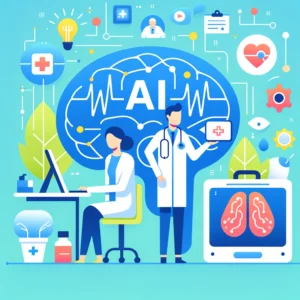Artificial Intelligence (AI) is revolutionizing various sectors, but its potential in healthcare is particularly transformative. “One of AI’s biggest potential benefits is to help people stay healthy so they don’t need a doctor, or at least not as often,” said PWC. This optimistic outlook highlights how AI is already making significant strides in disease detection, patient care, and even in understanding the human brain.
Early Detection and Enhanced Accuracy
AI technology is proving to be a game-changer in early disease detection and diagnosis. Traditional methods of diagnosing diseases like breast cancer often involve lengthy procedures and sometimes unnecessary invasive tests. However, AI software is changing this landscape. By interpreting mammograms and translating patient data into diagnostic information, AI can determine breast cancer risk 30 times faster than human doctors. Even more impressive is its accuracy—at 99%, AI’s precision in diagnosing breast cancer significantly reduces the need for unnecessary biopsies. This not only saves time and resources but also alleviates the physical and emotional strain on patients.
A Breakthrough in Non-Invasive Brain Activity Translation
One of the most exciting advancements in AI is the development of an AI-decoder capable of translating brain activity into a continuous stream of text. This breakthrough, detailed in a paper published in Nature Neuroscience, marks the first time that a person’s thoughts can be read non-invasively. Imagine the profound impact this could have on individuals who have lost their ability to communicate due to conditions like stroke or motor neurone disease.
Restoring Communication and Enhancing Lives
The ability to decode brain activity and translate it into text offers new hope for restoring speech and communication. For patients who struggle to express themselves, this technology could be life-changing. Stroke survivors and individuals with motor neurone disease often face immense challenges in communicating their needs and thoughts. With AI-decoding technology, these patients could regain their voice, enhancing their quality of life and providing a new level of independence.
The Future of Preventative Healthcare
AI’s role in healthcare extends beyond diagnostics and treatment. It holds the potential to shift the focus towards preventative care, helping individuals maintain their health and avoid frequent doctor visits. AI can monitor health data continuously, alerting patients and healthcare providers to potential issues before they become serious. This proactive approach to healthcare not only improves patient outcomes but also reduces the overall burden on healthcare systems.
Bridging the Gap in Healthcare Accessibility
AI also promises to bridge gaps in healthcare accessibility, particularly in underserved regions. Remote diagnostics and telemedicine powered by AI can bring high-quality healthcare to areas with limited access to medical professionals. This democratization of healthcare ensures that more people can benefit from early detection and timely treatment, regardless of their geographic location.
The Positive Impact on Healthcare Professionals
While AI is enhancing patient care, it is also positively impacting healthcare professionals. By taking over time-consuming tasks such as data analysis and initial diagnostics, AI allows doctors and nurses to focus on what they do best—providing compassionate, personalized care. This collaboration between AI and healthcare professionals can lead to more efficient, accurate, and patient-centered healthcare.
A Bright Future Ahead
The advancements in AI for healthcare are just the beginning. As technology continues to evolve, the possibilities for improving health outcomes and patient experiences are boundless. From early disease detection and non-invasive communication aids to preventative care and increased accessibility, AI is paving the way for a healthier, more connected world.
In conclusion, AI’s integration into healthcare heralds a future where medical care is more efficient, accurate, and accessible. These innovations not only promise to improve individual health outcomes but also have the potential to transform the entire healthcare landscape. Embracing AI’s capabilities and fostering its development will undoubtedly lead to a brighter, healthier future for all.
